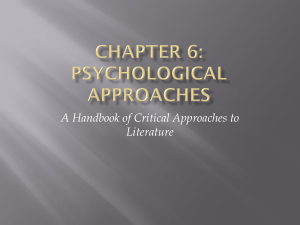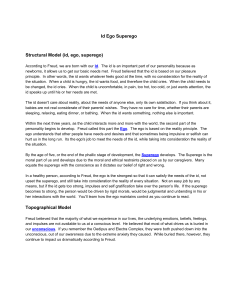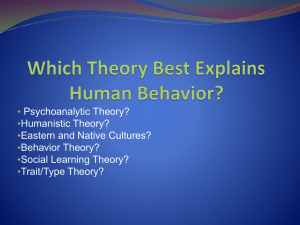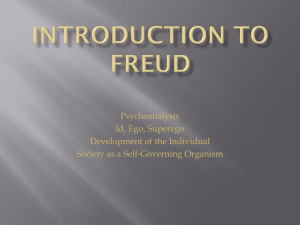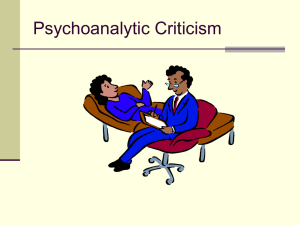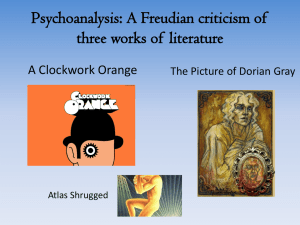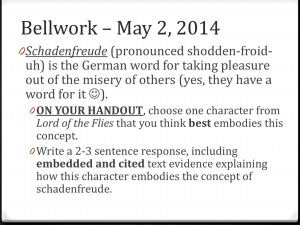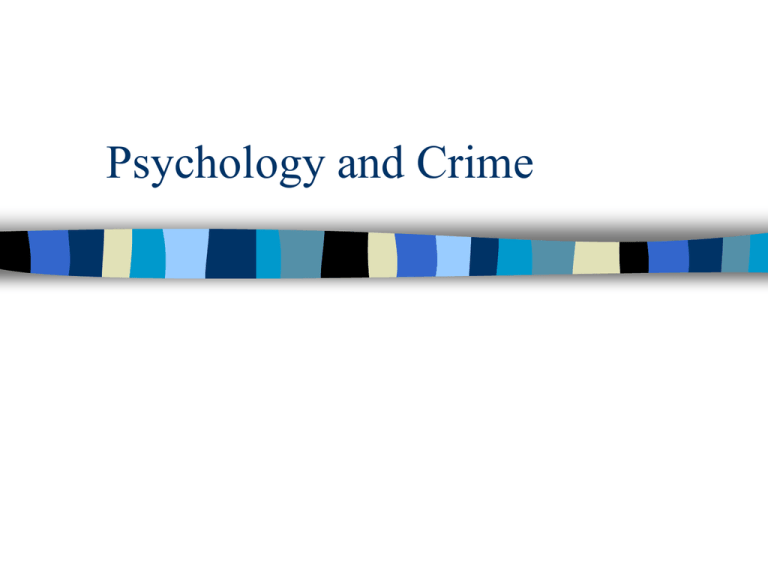
Psychology and Crime
Crime Times
• http://www.crimetimes.org/
Criminal Mind
Brain
Prefrontal cortex-Provides ability to plan, reason, concentrate, and adjust behavior,
Left cerebral hemisphere-Together with right cerebral hemisphere, controls most
conscious and mental activities
Brain tumor leads to pedophilia
• An egg-sized brain tumor caused a man with no
history of pedophilia to begin molesting children
• When he began visiting child pornography websites,
visiting prostitutes, and making sexual advances to
young children, his wife left him
Brain tumor leads to pedophilia
• Eventually he was convicted of child
molestation, and entered a treatment
program for pedophiles
Brain tumor leads to pedophilia
• At this point, doctors ordered
an MRI scan that showed a
large tumor in the right
orbitofrontal cortex
Experts say….
• We're dealing with the neurology of morality here,"
says Swerdlow
• The tumor caused few physical symptoms, he says,
"It's one of those areas where you could have a lot of
damage and a doctor would never suspect
something's wrong."
Structural brain abnormalities detected in pedophiles
• Researchers found that compared to
the controls, pedophiles showed
reduced gray matter volume in
the orbitofrontal cortex
the cerebellum
Statistics
• More than half of all prison and jail
inmates have a mental health problem:
1.Federal prisoners (45%)
2.State prisoners (56%)
3.Jail inmates (64%)
11% of the U.S. population age 18 or older met criteria for mental health disorders, based on data in
the National Epidemiologic Survey on Alcohol and Related Conditions, 2008 that uses a modified
Structured Clinical Interview for the Diagnostic and Statistical Manual of Mental Disorders
The most frequently reported problems
•
•
•
•
•
•
•
Major depressive or mania symptoms
Psychotic disorder symptoms
Delusions
Hallucinations
Ever attempted suicide
Persistent anger or irritability
Insomnia or hypersomnia
What does it mean?
1. Individuals with mental problems are more
likely to commit crimes
2. Individuals with mental problems are more
likely to be caught
3. Mentally healthy individuals develop mental
problems in prison
4. Individuals with mental problems are locked
up due to closing of mental health hospitals
across the US
Personality and Crime
• Many criminological theories use
personality traits to explain between
individual differences in criminal
behavior
• http://www.youtube.com/watch?v=g2Re_Fl_L4
• True story about Beth Thomas
Psychopath
• Images from movies like "Silence of The
Lambs”
• Serial killers are rare, but psychopathic
behavior is more common than you
might think
Psychopath
• Can learn the rules, but has no sense of
conscience and guilt
• "People know when something is wrong
because it feels wrong. I have to remember
or be reminded that stealing from someone is
wrong. I don’t feel bad if I take something."
Psychopath
• Children with this condition are "emotionally
blind“
• They are prone to have problems with
society, rules, expectations and relationships
Warning signs (Robert Hare, the leading
expert on the Psychopathic Personality)
• superficial charm
• self-centered & selfimportant
• need for stimulation &
prone to boredom
• deceptive behavior &
lying
• little remorse or guilt
• shallow emotional
response
• poor self-control
• promiscuous sexual
behavior
• lack of realistic long
term goals
• impulsive lifestyle
• irresponsible behavior
• blaming others for their
actions
• short term relationships
• juvenile delinquency
• breaking parole or
probation
• varied criminal activity
Psychopath
• http://www.youtube.com/watch?v=0qyCR
9tPDgM
What to do with psychopath
• So what happens to kids if they don’t learn
right from wrong?
• Many parents resort to punishment
• But what these children need is intensive
guidance, instruction, training, choices,
consequences and supervision
• Severe and repeated punishment alone is the
worst thing parents can do
Psychoanalytic Theory (Sigmund Freud)
• All humans have criminal tendencies
• Criminal tendencies are normal
• Through the process of socialization
these tendencies are curbed by the
development of inner controls that are
learned through childhood experience
Structure of Mind
• Id, ego, superego
• We are born with Id
• Id is based on our pleasure principle( if it
feels good, do it)
• The id contains all of our most basic animal
and primitive impulses that demand
satisfaction
EGO
• The ego is based on the reality principle
• The ego understands that other people have
needs
• The ego's job to meet the needs of the id,
while taking into consideration the reality of
the situation.
Superego
• By five, the Superego develops
• This is the moral part of us
• Many equate the superego with the
conscience as it dictates our belief of right
and wrong
Conscious
• Freud also believed that everything we
are aware of is stored in our conscious
• Most of what we are is buried and
inaccessible.
Preconscious
• This is the part of us that we can access if
prompted, but is not in our active conscious
• Its right below the surface, but still buried
somewhat unless we search for it
Unconscious
• Majority of what we experience in our lives, the
underlying emotions, beliefs, feelings, and impulses
are not available to us at a conscious level
• Oedipus and Electra Complex are pushed down into
the unconscious, out of our awareness due to the
extreme anxiety they caused
• While buried there, however, they continue to impact
us dramatically
Electra Complex
• According to Freud, during the phallic stage
(3-5 years) the daughter becomes attached to
her father and more hostile towards her
mother
• This is due mostly to the idea that the girl is
"envious" of her father's penis and wants to
possess it so strongly that she dreams of
bearing his children, thus the term "penisenvy“
• This leads to resentment towards her mother
Freudian slip
• Slips of the tongue and the pen,
misreadings, mishearings are due to
repressed wishes, conflicts, or traumas.
• For example:
• He: What would you like—bread and
butter, or cake?
• She: Bed and butter... Whoops!
Healthy balance
• We can think of the id as the 'devil on
our shoulder' and the superego as the
'angel on our shoulder.‘
• We don't want either one to get too
strong
• Role of ego is critical
Delinquent behavior
• Is a result of defective superego
• Inability to feel guilt, to learn from
experience, or to feel affection to others
Delinquent Behavior
• Is a result of overdeveloped superego
• Represses the id so harshly that
pressure builds up in the id and there is
an explosion of acting-out behavior
The New Asylums - FRONTLINE 1: Therapy Inside a
Prison
• http://www.youtube.com/watch?v=J5CK
HesC2Yw&feature=related

